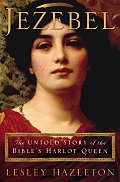 Just as there is an aphorism that “the victors write history,” there is another that says “history is continually rewritten.” Both of these sayings apply to this rehabilitation of the biblical queen. Hazelton views Jezebel’s story as an earlier version of tensions between liberalism and religious zealotry, drawing direct parallels to present day conundrums over Christian, Jewish, and Muslim fundamentalism. Hazelton’s prose is spellbinding, and though the book does not read like a novel, the story is riveting all the same. Rhetorical asides are satisfying and engrossing. There are many good, satisfying quotes from this book:
Just as there is an aphorism that “the victors write history,” there is another that says “history is continually rewritten.” Both of these sayings apply to this rehabilitation of the biblical queen. Hazelton views Jezebel’s story as an earlier version of tensions between liberalism and religious zealotry, drawing direct parallels to present day conundrums over Christian, Jewish, and Muslim fundamentalism. Hazelton’s prose is spellbinding, and though the book does not read like a novel, the story is riveting all the same. Rhetorical asides are satisfying and engrossing. There are many good, satisfying quotes from this book:
When your story is written by those in passionate opposition to everything you believe in, it will be, to put it mildly, warped. Everything becomes twisted; every action, every gesture, becomes not only suspect but turned on its head. The wildest rumors are passed off as fact. Inconvenient facts are ignored or edited out, relegated to oblivion, until all we are left with is not a real person but an image, a morality-tale character, which is how Jezebel would become a kind of wicked witch of the east.
The first thing Hazelton does is to dispense with the common portrayal of Jezebel as a sexualized being, a harlot. This was rather disappointing for me, because that was what motivated me to buy the book. I had read in another review that this book challenges the idea of the “sacred prostitute” in ancient Near East religions. I myself have become frustrated with the “sacred prostitute” terminology, having come to the conclusion that expressions of sexuality in ancient religions bears no resemblance to prostitution, sacred or otherwise. The concept of the “sacred prostitute” has long been politically used to denigrate priestess cults, and more recently to glorify prostitution. I would love to see this phrase stricken from our spiritual conversation.But if I hoped to find a more nuanced exploration of feminine sexuality in religion I was disappointed here on many levels. Hazelton begins her dismissal of the harlot angle by expounding on the limitations of nineteenth century archaeologists, always exasperating because at this point I can see clearly where such a setup is heading. After raking the pioneering archaeologists over the coals, she concedes that they did not come up with this sacred prostitute theory out of nowhere, then proceeds to accuse the Greek historian Herodotus of inventing the concept whole cloth. Hazelton’s treatment of this subject exemplifies problems with her narrative found throughout the book: the naïve acceptance of twenty-first century archaeological perspective, which has its own patriarchal biases; the impulse to conflate goddesses along with a generally poor understanding of Semitic polytheistic cultures; and a tendency for her analysis to fall into the very absolutism she decries in the prophets of Israel.But despite the flaws in perspective, I would not write off this book. The political drama surrounding the story is fascinating, and although this is not my forte, it seems that Hazelton has a good grasp of Old Testament history. She has visited most of the places where the action occurs, and her description of the settings adds an immediacy to her account. There is a map in the front of the book which is helpful.In the end I agree with Hazelton’s refusal to examine Jezebel’s life and legacy in sexual terms. The new framing works, at least for now, though perhaps in the future a biographer will dismiss the theme of religious fanaticism as emphatically as Hazelton dismisses the sexual theme. Like many a good myth, the story of Jezebel will probably always be more useful than it is true.
